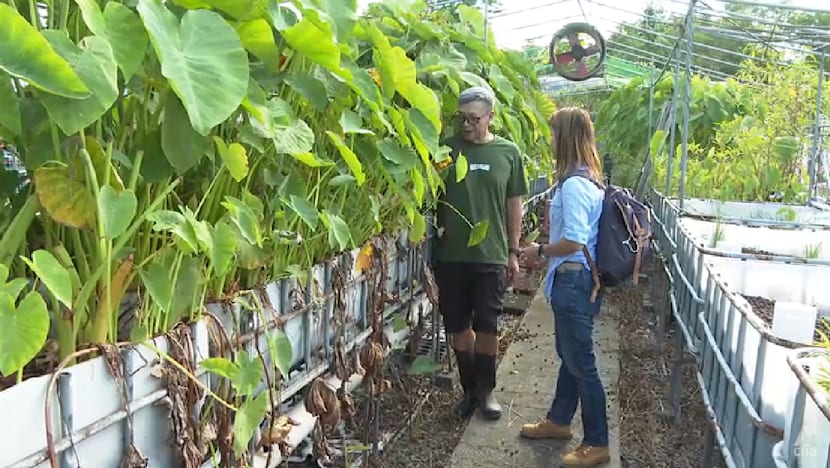‘Now I have nothing’: Hong Kong’s Northern Metropolis project forces residents from long-time homes
Plans were outlined last month to fast-track the development of the mega project, aimed at urbanising land near the border with tech hub Shenzhen in mainland China.

Ng Gam Ping and her husband have been living in their New Territories house for more than 40 years. But the property now sits on land earmarked for clearance under the Hong Kong government’s sweeping Northern Metropolis development — leaving them to face an uncertain future despite assurances that residents will be offered alternative housing.

This audio is generated by an AI tool.
HONG KONG: Eighty-two-year-old Ng Gam Ping and her husband believed the modest house they had called home for over four decades would be their final one.
But their plans for a quiet retirement have been upended.
The elderly couple’s property in the New Territories now sits on land earmarked for clearance under the Hong Kong government’s sweeping Northern Metropolis development — leaving them to face an uncertain future despite assurances that residents will be offered alternative housing.
“This place, this is something that we have worked hard for. We had the money to afford it. But now I have nothing,” said Ng.
“(The government) didn’t mention how they are going to relocate us. I am very disappointed. Now our future is like the ocean with no end and we can’t find a destination.”
ACCELERATING MEGA PROJECT
Hong Kong Chief Executive John Lee last month outlined plans to fast-track the development of the Northern Metropolis mega project, aimed at urbanising land near the border with tech hub Shenzhen in mainland China.
First announced in 2021, it will cover a total area of about 30,000 hectares — roughly one third of Hong Kong’s land mass.
Authorities hope the development will fuel economic growth as well as boost the innovation and technology sectors.
But the ambitious plan also means that residents who have lived there for decades will be forced to relocate.
The government has said it will offer housing for those affected.
However, observers believe it is unlikely that the new accommodation will match the size and space they currently enjoy, based on what was offered to others in past redevelopment and resettlement projects.
Long-time residents said the property's open spaces and strong sense of community with their neighbours have been a source of comfort.
Many told CNA that government officials have yet to explain what lies ahead — leaving them anxious and uncertain about their future.
KEEPING COMMUNITY TIES
Observers said clearer communication could have helped ease the fears of elderly residents, many of whom worry about feeling like strangers in a new housing environment.
This would also allow them to better understand what government schemes or compensation they are entitled to when they relocate, they added.
Jason Leung, head of land and housing research at think tank Our Hong Kong Foundation, said some of the new residents may not know one another as they live in far-flung villages.
“What can be done more is to arrange for community workers to go out and visit these people and help to arrange or recreate that kinship ties ... that used to exist before then,” he noted.
Leung suggested organising icebreaker sessions to help residents connect, and placing those from nearby villages in the same blocks.
“As far as possible, (efforts should be made to) try to reforge or transplant this kind of community ties into the new area,” he added.

A NEW ECONOMIC ENGINE
But it is not just residents who will be affected.
For 13 years, Cheung Kwai Choi has run a farm in the New Territories.
Initially opposed to the development, the 60-year-old is now resigned to the reality that he will have to shut down and move out.
“I am not supporting it — it’s just because I don’t have other solutions,” he said.
“For the current (Northern Metropolis development) plan, I was against it before. As for how it should be planned, it should be something we as the people can also participate in.
“We used to have freedom of expression. But now we don't have the freedom of expression, so we have no opportunity to participate.”
According to the government, the development, which started last year, will span over 20 years.
It will feature dedicated zones, including a hub for high-end professional services and logistics, an innovation and technology zone, and a new university town.
When completed, the Northern Metropolis aims to accommodate about 2.5 million residents and provide around 650,000 jobs.
In his recent annual policy address, Lee announced he would personally lead a new task force and introduce dedicated legislation to accelerate the initiative. He also pledged to adopt building technologies from China and overseas to reduce costs and construction time.
“It is now the optimal juncture to expedite the development of the area, bringing in industries and major projects,” said Lee, who will establish and chair the Committee on Development of the Northern Metropolis.
“The government will streamline administrative procedures, removing barriers and restrictions.”


















